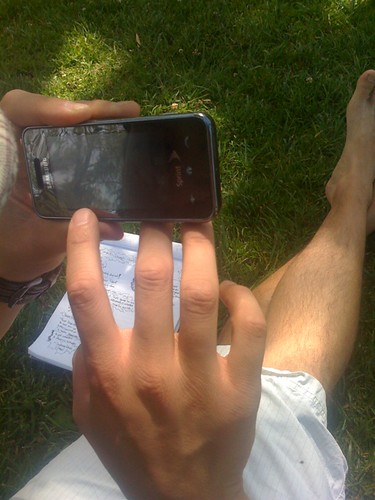
The best school technology is regularly found in students’ pockets. I can’t really see us arguing this fact at this point.
There is a slow seep of educational research about the learning potential that phones present for students of all grade levels. Hey, I even saw an AERA attendee twitter during a session on John Dewey and Urban Education.
The problem is in turning the potential of phones into actual practice. As I regularly joke to non-educators when phones come up in a conversation, cell phones are contraband on campus. Students sneak them in, take peeks at them throughout the day, whisper into them in the back of our classes, and text so furiously that hopefully you don’t notice it up front. But of course you do. And if you’re like many teachers at the school, you take the phone away or you send the student to the dean (again) or you lower their behavior grade.
But (and it’s a similar argument I make about graffiti), this is a losing battle. Cell phones are all but ubiquitous in my school (and I’d be willing to wager yours as well). Our approach to stopping access to phones and technology offers little in terms of allowing students to understand proper etiquette, use, and responsibility with a phone.
Currently, the use of phones within my class has been largely limited. For projects that find students networking outside of the classroom and school, I encourage students to make calls that are on task; I’m placing trust in them that they are doing this. Similarly, using Twitter for a project like Black Cloud meant recognizing that a student may be tapping keys on one of those keyboards that makes my thumbs all a fuddle. I also regularly receive and reply to text messages from students about class work, letters of rec., college questions, etc. Usually these questions arise in the afternoon and evening after school is over. However, I’ve also gotten these texts during the class day (on one day when I had a sub, a students was able to notify me that the sub was not adhering to a full day’s lesson plan and help re-guide the class back on task). Ditto phone calls. If we’re looking for answers to in-class questions, a student may hop onto the Internet and retrieve Wikipedia pages for classroom discussion.
There are a lot of neat “tricks” you can do with phones and iPhone apps only broaden the possibilities. However, for now, I want to think about how we as educators can use phones in a rather basic way – if we can all get on the same page, we can proceed to look at the even more cutting edge opportunities not afforded to every phone and every service provider. At this point, though, we can generally rely on a phone’s calling, texting and photographing features and safely assume that most students are able to easily participate.
All of that “stick with the simple” stuff being said, I should probably point out that shortly after an AERA session that talked briefly about cell phone use in an elementary setting (a great example I saw of keeping it simple), I hopped on a plane to Chicago to attend the Digital Media Learning Competition Showcase sponsored by the MacArthur Foundation (of which I just vented about below). While I’d been thinking about those basic features, I saw projects that are developing iPhone applications, locating students via some phones’ GPS, and generally pushing the boundaries in ways that are both inspiring and eye-opening. I’d love to look at how to get the technological resources to get these activities cooking in my class as well. Thinking big never hurt and the HASTAC/MacArthur folks I’ve met over the past year certainly know how to not only think big, but also actualize big.
I’m working towards a larger student-centered inquiry project with this in mind. I’m thinking about how students can use theory to conceptualize the use and function of a phone, its implications on modern communication and society, its future trajectory, and ways to elaborate on students leading the (soon-to-be teacher supported) effort to use phones in the classroom. As I develop the readings and curriculum for this unit, any suggested texts or activities you would like to suggest are appreciated.